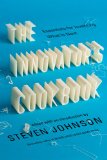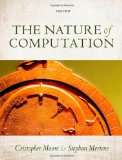October 5, 2011

The Innovator’s Cookbook: Essentials for Inventing What Is Next, edited by Steven Johnson (Riverhead Trade, 2011) has been issued in conjunction with the paperback edition of Where Good Ideas Come From: The Natural History of Innovation.
(kindle ed.), (amazon.co.uk)
Product description from the publisher:
Essential reading-and progressive thinking-on the subject of innovation, from the national bestselling author.
Steven Johnson, an acknowledged bestselling leader on the subject of innovation, gathers-for a foundational text on the subject of innovation-essays, interviews, and cutting-edge insights by such exciting field leaders as Peter Drucker, Richard Florida, Eric Von Hippel, Dean Keith Simonton, Arthur Koestler, John Seely Brown, and Marshall Berman. Johnson also provides new material from Marisa Mayer of Google, Twitter’s Biz Stone and Jack Dorsey, and Ray Ozzie, Microsoft’s former Chief Software Architect. With additional commentary by Johnson himself, this book reveals the innovation found in a wide range of fields, including science, technology, energy, transportation, education, art, and sociology, making it vital, fresh, and fascinating reading for our time, and for the future.
See also: Author’s website
Comments (0)
- culture,new books
October 4, 2011

The Better Angels of Our Nature: Why Violence Has Declined by Steven Pinker (Viking, 2011)
(kindle ed.), (amazon.co.uk)
Product description from the publisher:
The author of The New York Times bestseller The Stuff of Thought offers a controversial history of violence.
Faced with the ceaseless stream of news about war, crime, and terrorism, one could easily think we live in the most violent age ever seen. Yet as New York Times bestselling author Steven Pinker shows in this startling and engaging new work, just the opposite is true: violence has been diminishing for millennia and we may be living in the most peaceful time in our species’s existence. For most of history, war, slavery, infanticide, child abuse, assassinations, pogroms, gruesome punishments, deadly quarrels, and genocide were ordinary features of life. But today, Pinker shows (with the help of more than a hundred graphs and maps) all these forms of violence have dwindled and are widely condemned. How has this happened?
This groundbreaking book continues Pinker’s exploration of the essence of human nature, mixing psychology and history to provide a remarkable picture of an increasingly nonviolent world. The key, he explains, is to understand our intrinsic motives- the inner demons that incline us toward violence and the better angels that steer us away-and how changing circumstances have allowed our better angels to prevail. Exploding fatalist myths about humankind’s inherent violence and the curse of modernity, this ambitious and provocative book is sure to be hotly debated in living rooms and the Pentagon alike, and will challenge and change the way we think about our society.
See also: Author’s website, Edge Master Class 2011 on “A History of Violence,” Bing news search
Comments (0)
- culture,new books
October 3, 2011

Why Religion is Natural and Science is Not by Robert N. McCauley (Oxford University Press, 2011)
(kindle ed.), (amazon.co.uk – Jan 2012)
Product description from the publisher:
The battle between religion and science, competing methods of knowing ourselves and our world, has been raging for many centuries. Now scientists themselves are looking at cognitive foundations of religion–and arriving at some surprising conclusions.
Over the course of the past two decades, scholars have employed insights gleaned from cognitive science, evolutionary biology, and related disciplines to illuminate the study of religion. In Why Religion is Natural and Science Is Not, Robert N. McCauley, one of the founding fathers of the cognitive science of religion, argues that our minds are better suited to religious belief than to scientific inquiry. Drawing on the latest research and illustrating his argument with commonsense examples, McCauley argues that religion has existed for many thousands of years in every society because the kinds of explanations it provides are precisely the kinds that come naturally to human minds. Science, on the other hand, is a much more recent and rare development because it reaches radical conclusions and requires a kind of abstract thinking that only arises consistently under very specific social conditions. Religion makes intuitive sense to us, while science requires a lot of work. McCauley then draws out the larger implications of these findings. The naturalness of religion, he suggests, means that science poses no real threat to it, while the unnaturalness of science puts it in a surprisingly precarious position.
Rigorously argued and elegantly written, this provocative book will appeal to anyone interested in the ongoing debate between religion and science, and in the nature and workings of the human mind.
See also: Author’s website
Comments (0)
- cognitive science,culture,mind,new books
September 23, 2011

The Nature of Computation by Cristopher Moore and Stephan Mertens (Oxford University Press, USA, 2011)
(amazon.co.uk)
Book description from the publisher:
Computational complexity is one of the most beautiful fields of modern mathematics, and it is increasingly relevant to other sciences ranging from physics to biology. But this beauty is often buried underneath layers of unnecessary formalism, and exciting recent results like interactive proofs, cryptography, and quantum computing are usually considered too “advanced” to show to the typical student. The aim of this book is to bridge both gaps by explaining the deep ideas of theoretical computer science in a clear and enjoyable fashion, making them accessible to non computer scientists and to computer scientists who finally want to understand what their formalisms are actually telling.
This book gives a lucid and playful explanation of the field, starting with P and NP-completeness. The authors explain why the P vs. NP problem is so fundamental, and why it is so hard to resolve. They then lead the reader through the complexity of mazes and games; optimization in theory and practice; randomized algorithms, interactive proofs, and pseudorandomness; Markov chains and phase transitions; and the outer reaches of quantum computing.
At every turn, they use a minimum of formalism, providing explanations that are both deep and accessible. The book is intended for graduates and undergraduates, scientists from other areas who have long wanted to understand this subject, and experts who want to fall in love with this field all over again.
See also: Book website
Comments (0)
- culture,new books
September 22, 2011

Beyond the Finite: The Sublime in Art and Science ed. by Roald Hoffman and Iain Boyd Whyte (Oxford University Press, USA, 2011)
(kindle ed.), (amazon.co.uk – Jul)
Book description from the publisher:
Throughout its long history, and not just as the key aesthetic category for the Romantic Movement, the sublime has created the necessary link between aesthetic and moral judgment, offering the prospect of transcending the limits of measurement, even imagination. The best of science makes genuine claims to the sublime. For in science, as in art, every day brings the entirely new, the extreme, and the unrepresentable. How does one depict negative mass, for example, or the folding of a protein that is contagious? Can one capture emergent phenomena as they emerge? Science is continually faced with describing that which is beyond.
This book, through contributions from nine prominent scholars, tackles that challenge. The explorations within Beyond the Finite range from the images taken by the Hubble Telescope to David Bohm’s quantum romanticism, from Kant and Burke to a “downward spiraling infinity” of the 21st century sublime, all lucid yet transcendent. Squarely positioned at the interface between science and art, this volume’s chapters capture a remarkable variety of perspectives, with neuroscience, chemistry, astronomy, physics, film, painting and music discussed in relation to the sublime experience, topics surely to peak the interest of academics and students studying the sublime in various disciplines.
Google Books preview:
Comments (0)
- culture,new books







